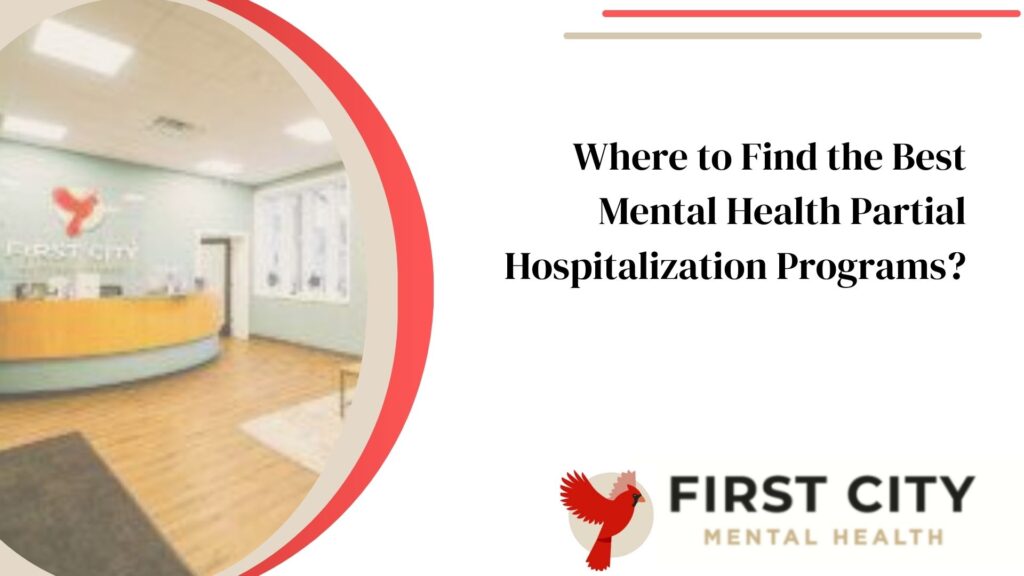
Why Choosing Accredited Centers Improves Co-Occurring Disorders Treatment Outcomes
July 30, 2025
How Long is a Residential Mental Health Treatment Program?
August 4, 2025If you or a loved one are struggling with mental health concerns, finding the right treatment can feel overwhelming. You may have tried different therapies and medications but still need more support to manage daily functioning.
The journey to reclaiming your well-being and independence is essential but challenging.
A Mental Health Partial Hospitalization Program (PHP) offers a practical solution by providing intensive care designed to help individuals stabilize their mental health without needing inpatient hospitalization.
In an outpatient setting, patients receive comprehensive support through group therapy, individual therapy, medication management, and life skills training.
This article will explore why choosing a partial hospitalization program might be the best option for you or someone you know. We’ll discuss its benefits, how it supports recovery, when it’s most appropriate, and where you can find top-rated programs like those offered in Indiana.
Continue reading to learn more about how a PHP could enhance your path toward improved mental health.
Key Takeaways
- Intensive Care Without Inpatient Stay: Mental Health Partial Hospitalization Programs (PHPs) offer intensive therapy and medication management without requiring an overnight stay. They provide a high level of care while allowing patients to live in their communities.
- Structured Daily Schedule: Participants engage in therapeutic programming for 6-8 hours daily, including group and individual therapy sessions. These sessions support mental health recovery and help individuals develop essential life skills.
- Comprehensive Support System: PHPs include multiple services such as counseling, dialectical behavioral therapy, sober housing options, and medication management supervised by psychiatrists to ensure holistic treatment.
What Are the Benefits of Partial Hospitalization Programs?
Partial hospitalization Kokomo programs offer unique advantages for those seeking intensive mental health care without staying overnight in a facility. These programs bridge the gap between residential and outpatient care, providing comprehensive support.
- Higher Level of Care: Partial hospitalization programs provide more intensive treatment than standard outpatient services. Patients receive group therapy, individual therapy, and medication management.
- Flexible Living Arrangements: Adult patients can live in sober housing off-site while participating in the program. This arrangement offers stability and freedom, allowing patients to attend school or work when not in therapy sessions.
- Structured Schedule: A typical day consists of 6-8 hours of therapeutic programming, which includes individual and group therapy sessions that support mental health recovery.
- Life Skills Reintegration: Focusing on life skills is crucial for helping patients reintegrate into independent living. Programs teach essential skills like managing daily tasks and handling stress effectively.
- Medication Management: Proper medication management ensures that adult patients receive the right dosage at the right times. A treatment team often includes a program psychiatrist who supervises this aspect of care.
- Comprehensive Support System: Participating in a partial hospitalization program means access to a range of mental health services. These include counseling, behavioral health techniques such as dialectical behavioral therapy, and other supportive interventions.
- Step Down from Inpatient Care: For those who have been hospitalized due to severe mental health symptoms, PHP serves as an intermediate step before transitioning to less intensive outpatient care. It helps stabilize patients while reducing the need for further hospitalization.
- Cost Considerations: Insurance companies or Medicare may cover partial hospitalization services, potentially lowering out-of-pocket costs for adult patients seeking intensive treatment options without requiring overnight stays.
How Does a Partial Hospitalization Program Support Recovery?
Patients receive comprehensive support to help them reintegrate into society. Group therapy sessions offer a platform for shared experiences, fostering community and understanding among participants.
Individual therapy provides focused attention on personal challenges and goals. These therapies are complemented by medication management, ensuring patients receive the proper dosages and adjustments as needed.
Participants in mental health partial hospitalization program live off-site in sober housing but engage in therapeutic programming for 6-8 hours daily. This structure allows individuals to learn essential life skills while still receiving intensive mental health care.
The program also prepares them for returning to work or school by gradually increasing their ability to manage daily activities independently without feeling overwhelmed by their mental illness.
When Is a Partial Hospitalization Program the Best Option?
Transitioning from how a partial hospitalization program mental health supports recovery, it’s crucial to consider the best time to enroll. A Partial Hospitalization Program (PHP) becomes essential after completing a residential program when an individual needs more support before transitioning to outpatient carefully.
This scenario often involves patients who need structured treatment plans but not 24-hour supervision.
PHP serves as the ideal choice for adults meeting certain requirements, like needing intensive therapy and medication management, but who don’t require overnight stays. Mental health professionals recommend PHPs for those aiming to stabilize their mental health while maintaining some level of independence.
In Indiana, many adult partial hospitalization programs offer a blend of group therapy, individual therapy, and other support services to integrate individuals into everyday life successfully.
The goal is to stabilize mental health and help individuals function independently.
Where to Find the Best Mental Health Partial Hospitalization Programs?

Indiana offers some of the best mental health partial hospitalization program PHP. Look for treatment centers in Kokomo that offer comprehensive PHP services lasting 30-45 days. These programs are ideal for individuals transitioning from residential care to outpatient support.
Patients benefit from therapeutic programming 6-8 hours daily, including group and individual therapy sessions. Many facilities provide medication management and other essential support services.
Evaluate options based on insurance coverage, out-of-pocket costs, and the availability of sober housing off-site to ensure it meets your treatment goals. Contact local therapists or outpatient providers for recommendations for Indiana’s partial hospitalization programs.
What Makes Partial Hospitalization Programs Unique?
Indiana Partial hospitalization programs (PHPs) stand out because they provide a structured, intensive level of care that bridges the gap between residential treatment and outpatient services.
Unlike outpatient programs, PHPs offer comprehensive support, including group therapy, individual counseling, and medication management over 6-8 hours daily. Patients live off-site in sober housing but engage in therapeutic activities that promote stabilization and independent living skills.
These programs are tailored to last 30-45 days, allowing enough time for significant progress without requiring an overnight stay like inpatient facilities. The goal is to help individuals stabilize their mental health conditions so they can eventually function independently at work or school.
This approach ensures patients receive a high level of care while gradually reintegrating into their daily lives.
What Conditions Are Best Treated in a Partial Hospitalization Program?
A Mental Health Partial Hospitalization Program (PHP) offers comprehensive care without requiring an overnight stay. This program is suitable for various mental health conditions. A detailed list explains which conditions are best treated through this program.
Depression
PHP provides structured daily therapy sessions.
Patients receive both individual and group counseling.
Medication management helps stabilize their emotional state.
Anxiety Disorders
Daily sessions teach coping mechanisms like cognitive-behavioral therapy (CBT).
Helps individuals manage severe symptoms when outpatient therapy isn’t enough.
Anxiety can be closely monitored, and adjustments can be made to treatments if necessary.
Bipolar Disorder
It helps maintain stability during depressive or manic phases.
It provides a safe space for expressing emotions and addressing mood swings.
Medication adherence is reinforced, reducing the chances of relapse.
Post-Traumatic Stress Disorder (PTSD)
Intensive therapy sessions help process traumatic events more effectively than less frequent outpatient visits.
Offers therapeutic techniques like Eye Movement Desensitization and Reprocessing (EMDR).
Group settings allow sharing experiences with others who understand similar struggles.
Substance Abuse Disorders
Programs often integrate substance abuse treatment, offering dual-diagnosis support.
It helps individuals build strategies to avoid relapse while managing mental health symptoms.
Offers education on the impact of substance use on overall well-being.
Borderline Personality Disorder (BPD)
PHPs offer Dialectical Behavior Therapy (DBT), which is highly effective for BPD.
Frequent monitoring and support help in managing intense emotions and self-destructive behaviors.
Teaches skills for improving relationships and reducing impulsivity.
Eating Disorders
Structured meals with supervision ensure nutritional compliance.
Therapy addresses underlying psychological issues related to eating habits.
Nutritional counseling aids in developing healthier eating patterns.
Obsessive-Compulsive Disorder (OCD)
Exposure and Response Prevention (ERP) therapy helps reduce compulsive behaviors.
Continuous support helps patients practice new skills in real-time settings.
Frequent check-ins make it easier to track progress and modify the treatment plan as needed.
Schizophrenia
Provides ongoing medication management, crucial for symptom control.
Skills training assists patients in adapting to daily life activities despite their condition.
Regular therapeutic interactions help improve socialization skills and reduce isolation feelings.
Each condition benefits from the intensive, multi-faceted approach of Mental Health Partial Hospitalization Programs, allowing individuals to stabilize their lives while receiving comprehensive care without entire hospitalization.
When to Seek a Partial Hospitalization Program for Anxiety Disorders?
Individuals experiencing severe anxiety that disrupts daily life should consider an adult partial hospitalization program (PHP). Such programs offer intensive support, including group and individual therapy sessions for 6-8 hours daily.
These programs provide more comprehensive care than standard outpatient services, aiding in mental health stabilization.
Those transitioning from a residential program or seeking to avoid full-time hospitalization can benefit greatly from PHPs. Living in the community while receiving structured treatment helps patients re-integrate into society without feeling overwhelmed by their disorders.
Indiana offers various options for mental health partial hospitalization, ensuring access to effective treatments closer to home.
How Do Partial Hospitalization Programs Help with Medication Management?
Transitioning from recognizing the need for a partial hospitalization program in Indiana (PHP) for anxiety disorders, it’s essential to understand how these programs manage medications. PHPs provide an elevated level of care that includes meticulous medication management.
Medical professionals assess each patient’s needs and adjust prescriptions to stabilize mental health. Regular check-ins allow therapists and doctors to monitor progress closely, ensuring medications are effective without adverse side effects.
Daily participation in therapeutic activities reinforces medication routines within the framework of PHP. Patients engage in different forms of therapy for 6-8 hours daily while healthcare providers oversee their medication schedules.
This holistic approach helps patients not only maintain proper use but also learn independent living skills crucial for life outside the program. PHPs facilitate a stable path toward recovery and independence by emphasizing consistent support combined with structured supervision.
Conclusion
Choosing a Mental Health Partial Hospitalization Program can significantly aid recovery. Intensive care, group therapy, and medication management help stabilize mental health. Participating for 6-8 hours daily ensures comprehensive support without the need to stay overnight.
These programs assist individuals in managing daily activities and reintegrating into work or school life. Patients live in the community while attending treatment sessions, allowing them to practice new skills in real-life settings.
This structured yet flexible approach makes it an ideal choice for many facing mental health challenges.
F.A.Q.s
What is a partial hospitalization program (PHP) for mental health?
A partial hospitalization program (PHP) for mental health offers intensive treatment without requiring an overnight stay.
Why choose a partial hospitalization program in Indiana?
Choosing a partial hospitalization program in Indiana provides access to specialized mental health treatment and other health services tailored to local needs.
How does PHP compare to entire hospitalization?
Unlike full hospitalization, PHP lets patients participate in daily therapy sessions but return home at night, reducing out-of-pocket costs.
Will my insurance company cover the cost of a PHP?
Many insurance companies cover the cost of a partial hospitalization in Kokomo or other areas, but it’s essential to check your specific plan details.
Who should consider enrolling in a PHP?
Individuals who need structured support but do not require 24-hour care should consider enrolling in a partial hospitalization program for their mental health treatment needs.






